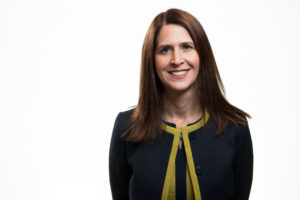If someone from PURE Group decides to leave the high-net-worth insurer to pursue a career as a race car driver or an avalanche rescuer, the carrier’s leaders wouldn’t be devastated.
Executive Summary
When a college senior tells his or her parents, “I’ve got interviews set up with IBM and PURE Insurance,” the carrier name isn’t one that moms and dads will recognize, CHRO Katherine Richardson told CM. But PURE continues to attract young people nonetheless with a purpose-driven culture, benefits like passion courses, and hiring and training practices that support its continued commitment to core principles.“We might have a moment of sadness when people leave, but if they’re going off to pursue their passions, then that’s a win,” said Katherine Richardson, chief human resources officer of the White Plains, N.Y.-based insurance group. “That would make us happy, honestly,” she said, when asked about the prospect of employees exiting after using a tuition reimbursement benefit for “passion courses”—courses unrelated to their careers at PURE but instead helping them pursue personal passions.
The benefit, which has allowed employees to become yacht captains, poets, comedians and certified yoga instructors, doesn’t typically prompt them to leave the company. “The only requirement from us is that it leads to some sort of designation,” said Richardson, noting that one woman who used the funds to become a certified self-defense instructor now teaches fellow employees.
Pursuing their passions brings “them a new confidence that has been very beneficial at work,” she said.
In fact, passion is one of four traits that PURE looks for when it evaluates candidates seeking to join the company. “When we say passion, we mean that feeling of what it means when you have a talent that you share and that you work intensely for something you believe in,” Richardson said, listing intellectual curiosity, empathy and the ability to be a team player as the other traits. (See related sidebar: PURE Principles and Employee Traits)
What PURE employees intensely believe in is “membercentricity”—a phrase the carrier used throughout its 14-year history to describe meaningful engagement with policyholder members of the Professional Underwriters Reciprocal Exchange. And in what Richardson refers to as a “purpose-driven, principles-led” culture, the purpose is to make “members smarter, safer and more resilient so they can pursue their passions with greater confidence.”
Michael O’Malley and William Baker, authors of the recently published book “Organizations for People: Caring Cultures, Basic Needs, and Better Lives,” describe the interconnection between PURE’s emphasis on employing people with passion, curiosity and EQ and the ultimate purpose of the carrier, explaining how they need to be creative problem-solvers when they respond in unscripted, authentic ways to unique loss situations involving devastating circumstances or damaged personal property to which insureds have become emotionally attached. PURE is the only insurer among the 21 companies included in the book that the researchers view as humane companies. (See also, “What the ‘Best Companies to Work For’ Do Differently,” written by O’Malley for Harvard Business Review, Dec. 12, 2019.)
While the book also describes health and wellness benefits, articles in employee benefits and talent publications highlight a student loan repayment assistance program (paying $100 per month in addition to an employee’s minimum payment) and unlimited PTOs among the ones that helped PURE garner a 4.1 star rating (out of five) on Glassdoor and 24th place spot on Fortune’s 2019 Great Places to Work ranking for small and medium-sized financial companies.
There is an overarching theme for all these benefits, Richardson told CM. “They come back to the same point, which is that we are truly committed to the whole person. And if we’re going to be able to deliver an exceptional member experience, we recognize that our employees themselves have to feel like they have a valued place in the company. That involves not just recognizing their contributions at work but recognizing them as a whole person navigating the universe through life changes—through marriages and divorces and relationships and having kids and wanting to learn new skills.”
Giving some more specific examples, she noted that PURE offers parental leave and counseling for mothers and fathers—”first kid or not first kid—who are trying to figure out how to balance the challenges of work and life.”
“What’s different here at PURE is that we don’t necessarily start with a very rigid view of the return on investment that we expect from adding a benefit,” said Richardson, whose entire career has been involved with insurance companies. She offered parental leave with an added phase-back program as an example. “It wasn’t that we were losing people. In fact, they were coming back from maternity leave and continuing their careers in an engaged way…We added it because it aligned with our values,” she said, explaining that primary caregivers returning from parental leave work just two days during their first week back while getting paid for a full week. The second week, they work three, and then four. “Over three or four weeks, you ramp back up to full time so you can get comfortable with the new routine of childcare,” she said.
Employees dealing with other circumstances can use the Flex PTO benefit. Flex PTO means employees at all levels—not just senior executives but also people in front-line customer service positions—are not assigned a specific number of vacation days in any given year. “Everybody is allowed to take what they need to live the life they want,” Richardson said.
“I can think of a time where a person was just facing mental health challenges and needed some space to get the right care and treatments, to get medicines evened out,” she said. “You learn after a long career in HR that people have really complicated lives…To work at a place where you can feel that you’re supported and trusted and that somebody has your back, that you can share what these problems are with a working community who cares, and that we’re going to work together to come up with something that works—that is something that we are very proud of and committed to,” she said.
Richardson also noted PURE’s commitment to mental health and meditation, even giving everyone access to a free membership to Headspace, referring to an app-driven meditation program. The White Plains home office also has meditation rooms and a quiet space.
“We actually have shared meditation. A few times a week, one of my colleagues uses the Headspace app, and we gather in a conference room to spend 10 minutes centering our minds together. Our CEO is a huge fan,” she said, noting that if Ross Buchmueller is not in another meeting, he attends. “He sits on the floor when there are not enough chairs, closes his eyes and focuses on whatever the topic of the medication is.”
Cultural Fits
Richardson noted that PURE hires a lot of people right out of school—four-year university degree programs—who typically had no intention of having an insurance career. The benefits may help, but the real attraction is something bigger. “They’re drawn to us because we’re a purpose-driven and principles-led organization that cares about its people, and we appeal to their intellectual curiosity, and we teach them something new and then teach them something new again.”
 “Our employees themselves have to feel like they have a valued place in the company. That involves not just recognizing their contributions at work but recognizing them as a whole person navigating the universe through life changes.”
“Our employees themselves have to feel like they have a valued place in the company. That involves not just recognizing their contributions at work but recognizing them as a whole person navigating the universe through life changes.”Recognizing “the emotional connections in the service that we provide,” hiring interviews are led by people specially trained to ask questions around emotional intelligence and cultural contribution. “We look at EQ as a teachable skill as well,” Richardson added. “So everybody at PURE goes through a day-long training, usually in your first year, to help cultivate and develop sensitivity and skill around emotional intelligence.” (For more information on PURE’s hiring and training for EQ, see the June 18, 2017 CM article, “Setting PURE Group Apart: The EQ Strategy for Successful Member Engagement.”)
The employee traits of EQ, curiosity, passion and teamwork continue to be measured as part of performance management processes, too, she said. “Everybody at PURE gets a performance score related to their achievement of assigned objectives, and then they get another cultural contribution score,” she said.
First Principles—and a Refresh
Richardson noted: “At PURE, there’s not just an HR person who can speak eloquently and passionately about our commitment to purpose and principles and our people. Every single person in this company is capable of speaking to our values, our purpose and our principles really effectively because we invest the time in thinking about what exactly we are saying when we say the words. And we spend time reinforcing them and making sure that they aren’t jargon—that they are really tools that guide our day.”
While “membercentricity” is still a core focus of the enterprise, Richardson and Buchmueller decided shortly after she joined PURE in late 2017 that it needed to be redefined and that other existing principles needed refreshing. “We just wanted to make sure that the words on the paper were still real and vibrant and that people across the organization, which is growing by leaps and bounds, were still resonating and having the impact that were intended when they were written,” she said, noting that PURE engaged with a consulting partner to help.
Forming focus groups across the organization that included cross sections of functions, offices, and age and gender demographics, they surveyed the groups, asking which principles resonated and what they thought the principles meant. While membercentricity was the highest-rated principle—”people loved it”—employees defined it to mean “provide great customer service.”
“Providing great customer service is a part of what we mean. But we want [employees] to understand that practicing membercentricity is [not only] about keeping your eye on the member but also about protecting the membership,” she said. “We were trying to accomplish something more complex…So, it caused us to change some of the wording.”
New principles replace the words “Practice membercentricity” with “We think about the long term” and “We balance the needs of each member with the interests of the entire membership.”
Buchmueller echoed the message through an example in PURE’s 2018 Annual Report, addressing the angst that employees feel when they have to nonrenew a loyal member because new analytics or changing conditions make the likelihood of an underwriting profit remote. “Not offering a renewal to a PURE member may be the least enjoyable thing that our staff does, but it might be one of the more important actions for the membership at large. It keeps premiums fair,…helps strengthen PURE’s financial condition and serves the best interests of our membership, even if it upsets an existing member,” he wrote.
Also gone are principles that said: “Use empathy, creativity and urgency to be exceptional. Be a team player. Be obsessed with getting better. Have fun.” Richardson explained the employee traits capture most of these. “It doesn’t mean that we don’t have fun. We’ve got foosball tables and people down the hall playing ping pong right now,” she said.
“The fun stuff is great, but all of the little gimmicky things weren’t really what we were aiming at. When we said have fun, we really meant bring the full bear[ing] of your intellect and talents to solving problems with people you care about,” she said.
With the principles recrafted, PURE is reinforcing them with a series of exercises that every employee goes through—eight people at a time, more than 90 times across the U.S., participating in cross-functional groups. Each group self-facilitates this two-hour connection to our purpose and principles,” she said, referring to it as Phase One. Soon-to-be rolled out Phase Two will involve manager-led connections to the purpose and principles. So, beyond understanding impacts on colleagues in other disciplines, the next phase “is more about expressing how in this job, in this time, for you, with your specific work colleagues, how you are connecting with these concepts,” she said.
In addition to PURE’s commitment to its principles, Richardson said that the insurer has a unique commitment to mobility—”to helping people grow their career across our organization”—noting, for example, that PURE claims adjusters can become risk managers and that the head of risk management actually came out of the branch management sales environment.
“People can learn most everything, and if you just build on employee strengths and not obsessively think about their weaknesses, it’s a great talent model,” she said, noting that there isn’t a specific training program involved. “We will take the thing that people are best at, and we’re willing to offer them a supportive environment to gain the technical skills. And frankly, sometimes you get really great results when you bring somebody in” with a fresh perspective. They ask the obvious question, “Why are you doing it that way?”
PURE does have formal training for recent college graduates, including an underwriter training program, a member advocate training program and a product analyst training program. “We physically bring them to White Plains for six or eight weeks. We put them up in housing down the street, and they are able to create a sense of community with each other…That connection endures over time,” she said, noting that the summer classes spark kinship that later spreads out across the country after they officially join the organization.





















 PURE Group Workplace Honors
PURE Group Workplace Honors
 Five AI Trends Reshaping Insurance in 2026
Five AI Trends Reshaping Insurance in 2026  RLI Inks 30th Straight Full-Year Underwriting Profit
RLI Inks 30th Straight Full-Year Underwriting Profit  What Analysts Are Saying About the 2026 P/C Insurance Market
What Analysts Are Saying About the 2026 P/C Insurance Market  Winter Storm Fern to Cost $4B to $6.7B in Insured Losses: KCC, Verisk
Winter Storm Fern to Cost $4B to $6.7B in Insured Losses: KCC, Verisk 







